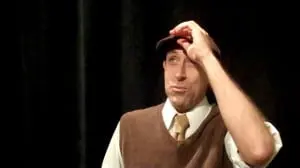Groundbreaking British satirical comedy lives again in Depot Theatre production
By Alison Rooney
We live in an age where satire often overtakes its subject, in which the satirized are frequently in on the joke, or at least wish they were. This freedom to roast societal mores, public figures and virtually any target on the coals of humor wasn’t always the staple of comedy that it is now — not here or across the pond. It simply wasn’t done in British humor until the advent of Beyond the Fringe (BTF), which made its debut at the Edinburgh Festival in 1960.

A compilation of sketches taking aim at everything from politicians and the royal family to preserved-in-aspic rituals of post-World War II British life, the show brought together a foursome, Alan Bennett, Peter Cook, Jonathan Miller and Dudley Moore, who had performed material in this vein in various combinations at Oxford and Cambridge in the late 1950s. Long runs in the West End and a successful Broadway transfer followed, as did a partnership between Cook and Moore, which lasted for decades.
BTF is widely acknowledged as an inspiration for Monty Python, That Was the Week That Was, Rowan Atkinson, and much of the British humor of the past half-century. This, in turn spawned such North American variants as Laugh-In, Saturday Night Live and Second City Television. It has been described as giving voice to a sense of loss of national purpose, with the end of the British Empire, albeit in a very, very silly way. And now that silliness mixed with daggers is being revived by the Depot Theatre, in association with World’s End Theater (WET), with four Yanks putting their Brit on and presenting the material to a new audience.

The ringleader of this band of merry men is Joe Dunn, who both directs and co-stars, along with Andre Herzegovich, Donald Kimmel and Taylor Douglas. Dunn has had a professional involvement with BTF before. He started off as a comedy writer in Los Angeles, working for syndicated shows, then shifted into performing, doing improv training at the famous The Groundlings improv and sketch comedy theater.
After a year spent in the house troupe at the Comedy Store, followed by another guesting with different troupes, he felt the urge to do longer shows and plays and created a company, The ReEstablishment Theater, which subsequently found its own home in the 65-seat theater above which Dunn lived. A fan of British comedy since childhood, and having “hooked into” BTF “age at 10 or 12,” he performed in a run of it in Los Angeles about 14 years ago. Dunn’s wife received a job offer, which brought them to the Hudson Valley about four years ago.
Dunn felt confident in suggesting this production to the Depot Theatre when a three-week slot opened up without much notice. “I know the show very well logistically, and it’s not complicated. I had a couple of potential cast members in mind, some of whom I had worked with (in last’s year’s WET production of A Way of the World), and I thought we could make a decent go of it — the absurdist humor is timeless.”

Since there were multiple editions of BTF, Dunn and his colleagues have been able to use a pick-one-from-column-A approach, excising some sketches whose then-topicality now renders them too obscure. “Most of the material really stands up,” he said. Though some references are of a historical nature, most of it is universal, “and just plain silly,” said Kimmel.
“It had a profound effect on the culture, on how the British public interacted with government, church, the authorities — it left few sacred cows unskewered,” noted Dunn.
Kimmel added: “That’s probably why it had such an impact — it managed to sabotage their culture on a number of levels in such a ridiculously silly way. Whether or not you’re the person being laughed at, you had to laugh at yourself. Good satire has to have that element that allows you to laugh at yourself.”
There wasn’t a thought of transposing any of it to an American setting and/or to modernizing it. As such these four American actors have to convincingly settle into the skins of quintessentially British types and characters. The key to it, said Dunn, is that the dialogue is almost like a musical score. “The original inflections have a tonality; performing it differently is like hearing a sour note. It doesn’t necessarily lend itself to new interpretation.”
Kimmel concurred: “The rhythm is very clearly spelled out in the text. Once you get the hang of the dialect you apply to it, it’s obvious if you make the wrong choice — you realize it.”
In fact, Dunn very recently discovered a televised version dating from the 1990s, having never seen it before, and was surprised to find very similar cadences there, so even without a reference point “we knew the genre well; a new twist wasn’t necessary.”
What they have come up with will wind up being a series of three- to 15-minute sketches, with disparate targets. The actors are mixing and matching, no one actor is taking on, for example, just the Jonathan Miller roles. In addition, they’ve included several sketches in the second act written by comedians associated with BTF, which Dunn called “a bonus treat.”
BTF will be performed May 10-26, Friday and Saturday at 8 p.m., Sunday at 2 p.m. Tickets can be ordered through brownpapertickets.com or by phoning the box office at 845-424-3900.
Photos courtesy the Depot Theatre

